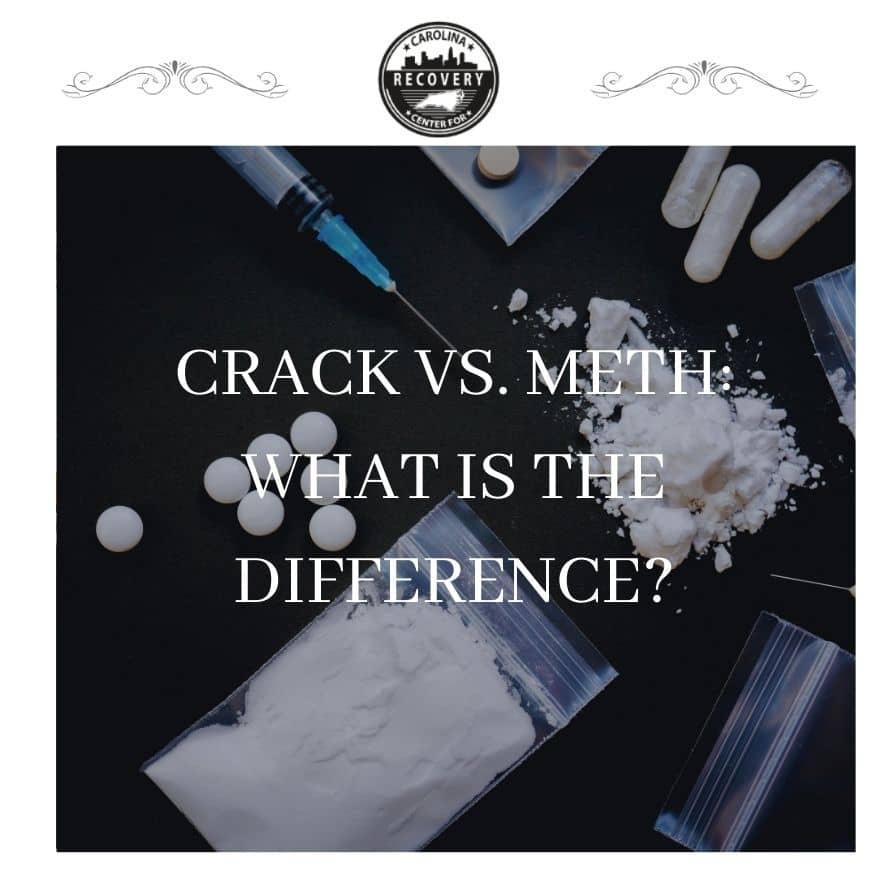Crack vs. Meth: What is the Difference?

Medically Verified: 2/1/24
Medical Reviewer
Chief Editor

All of the information on this page has been reviewed and verified by a certified addiction professional.
Different drugs can have very different effects. But crack and meth give users more energy and can cause similar effects. So, crack vs. meth: what are the differences?
This guide will give you a basic understanding of what crack and meth are, how they work, and the signs of addiction to these drugs. For more information or to find addiction treatment, contact the Carolina Center for Recovery team today.
What is Crack?
Crack is an illicit stimulant drug that comes from the coca plant. Crack is a crystallized form of cocaine that shares its stimulant properties but is generally much more potent. Users heat and smoke crack, which gets its name from the crackling sound it makes when heated. Crack can be white, pale pink, or yellow in color.
Crack stimulates the central nervous system and increases dopamine. Users feel the effects very quickly–usually in just a few seconds. Short-term effects include:
- Euphoria
- Increased alertness
- Paranoia
- Heightened sensitivity to sounds, sights, and touch
- Dilated pupils
- Rapid heartbeat
- High blood pressure
- Irritability
Over time, people who use crack frequently may experience significant long-term harm to their health, including psychosis, respiratory damage, cardiovascular issues, and malnourishment.
What is Meth?
Meth is a synthetic stimulant drug that comes in powder, pill, or crystals. People make meth by combining hazardous chemicals, including acetone and pseudoephedrine. People smoke or inject meth.
Crystal meth users experience:
- Rapid heartbeat and breathing
- Increased blood pressure
- Elevated body temperature
- Anxiety
- Paranoia
- Aggressive or violent behaviors
- Tremors
- Cardiovascular problems, including heart attacks or stroke
- Convulsions
- Death
The effects of meth can last for up to 8 hours. The long-term effects of using meth can be severe and include:
- Changes in brain function
- Chronic anxiety
- Delusions
- Memory loss
- Paranoia
- Decreased verbal and motor skills
- Aggression and violence
- Severe dental problems
People who use meth are at risk of developing or worsening mental health problems and psychosis. Cardiovascular issues, including hypertension and rapid heart rate, are common among people with meth addiction. They also risk contracting HIV and Hepatitis B and C from sharing contaminated needles.
Crack vs. Meth: What are the Differences?
Crack and meth are both stimulant drugs but they are not the same substance. Both drugs can cause severe, long-term damage and pose a significant risk for addiction.
Crack is derived from the coca plant. Processing requires water and substances like baking soda. Meth, on the other hand, is a synthetic drug, meaning people make it by combining hazardous chemicals. It is highly unregulated, and users cannot be sure of what is in the meth they’re using. The quality may also vary from batch to batch, meaning some meth may be much more potent than others.
Smoking or shooting crack doesn’t result in a long-lasting high. Effects may be intense but brief. Meth provides a long high that lasts several hours or more.
What are the Similarities between Crack and Meth?
Crack and meth both stimulate the central nervous system (CNS) and increase neurotransmitters involved in pleasure and reward. Both crack and meth are highly addictive, illegal, and can cause severe long-term harm to your mental and physical health.
Some people may wonder about crack vs. meth and which drug is more harmful. But the truth is that both drugs cause serious harm to your short and long-term health. Both drugs can lead you down a road of addiction that is very difficult to overcome. Crack and meth can both keep you from living the life you choose, rob you of memories and experiences, and cause life-altering legal and financial issues.
Both drugs put people at risk of immediate danger and require comprehensive treatment.
Crack and Meth Abuse and Addiction
It’s essential to recognize the signs of meth and crack abuse so that you can get the help you need to stop using drugs safely and avoid relapse later.
Some signs of meth abuse include:
- Loss of interest in hobbies, relationships, work, or school
- Criminal behavior, such as stealing to obtain money or drugs
- Risky behaviors like driving under the influence or having risky sex
- Lack of sleep for long periods
- Extreme anxiety
- Crashing–having periods of depression, fatigue, and cravings
- Skin sores
- Irritability and paranoia
- Significant weight loss
- Poor motor skills
- Memory problems
Some signs of crack abuse include:
- Aggression
- Irritability
- Paranoia
- Anxiety
- Heightened alertness
- Decreased appetite
- Elevated body temperature
- Hallucinations about bugs under the skin
- Euphoria
- Hallucinations
- Dilated pupils
- Changes in sleep and appetite
Some people may mix crack and meth, but this is extremely dangerous. Users often experience extended periods of euphoria but have a harder “crash” and suffer extreme fatigue and depression. Using crack and meth together also puts people at a greater risk of overdose.
Don’t wait to get treatment if you or someone you love have any signs of crack and meth addiction. Crack and meth are dangerous, highly-addictive illicit drugs that can have devastating consequences.
Comprehensive addiction treatment can help you detox safely from crack and meth and give you the treatment and support you need to stop using drugs for the rest of your life.
Find Help Now
If you’re curious about the differences between crack and meth, reach out to the knowledgeable specialists at the Carolina Center for Recovery to learn more. If you or someone you love needs treatment for crack addiction or treatment for meth addiction, call our admissions team today to explore your treatment options and find the support you need to recover from addiction.
References:

